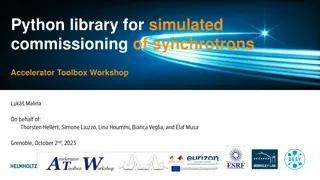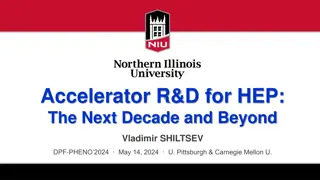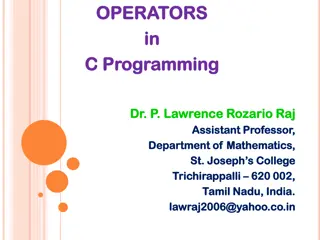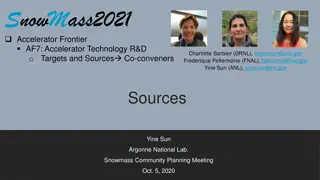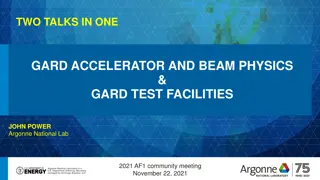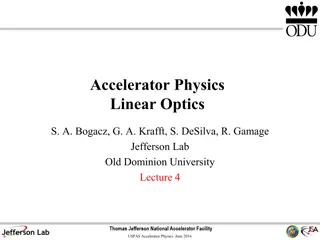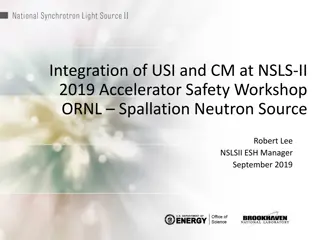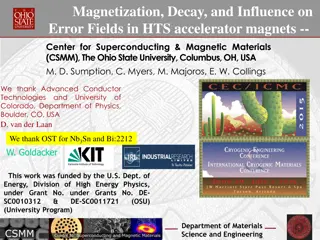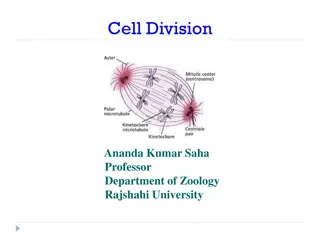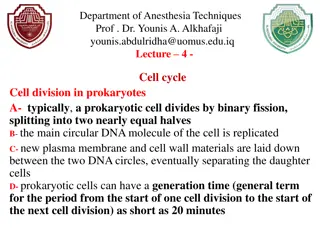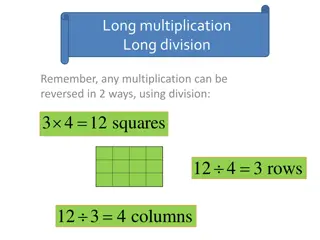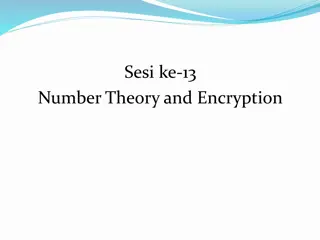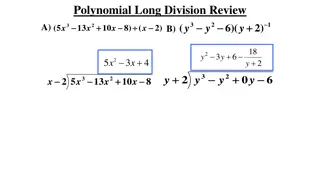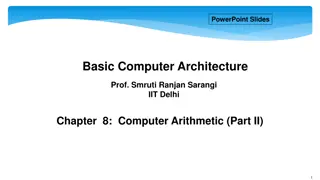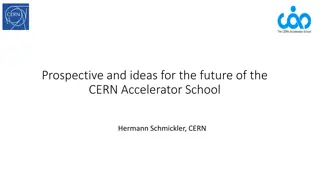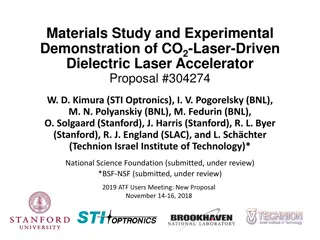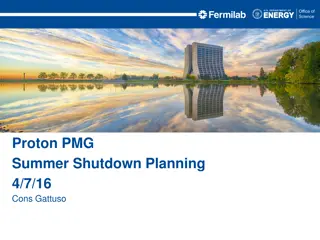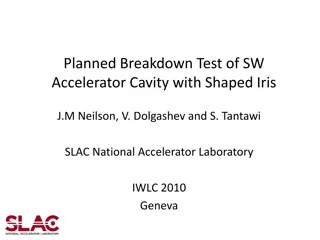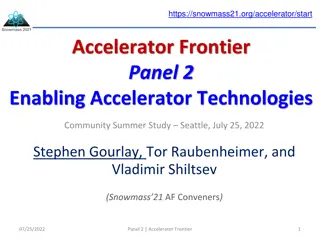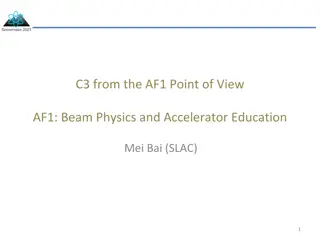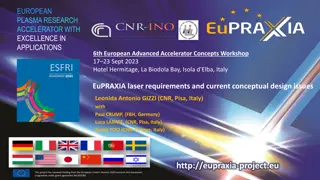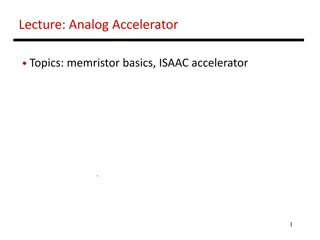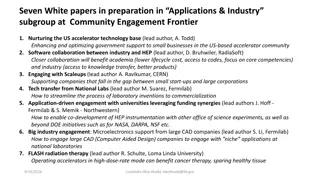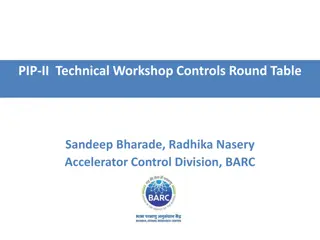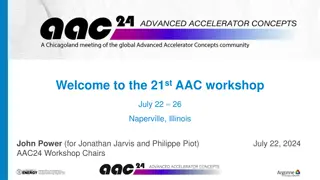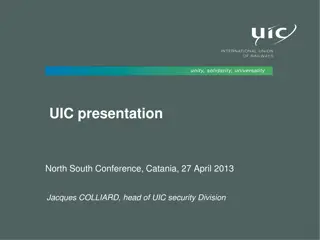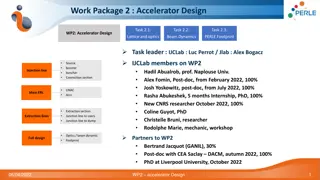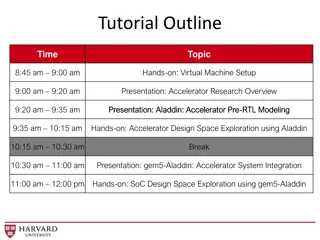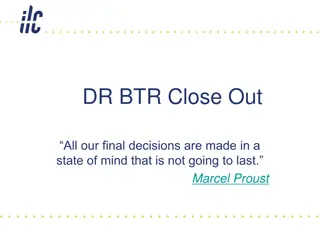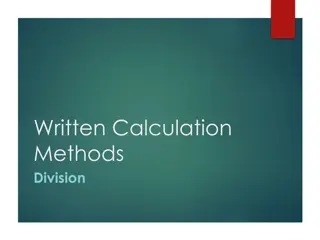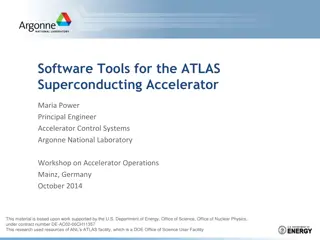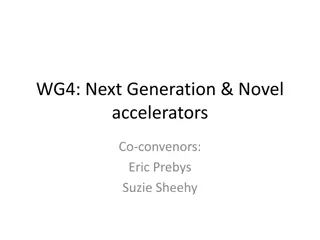The SDG Accelerator Fund
The SDG Accelerator Fund aims to establish a replicable financial facility that links key actors and utilizes blockchain technology to support SMEs in achieving the Sustainable Development Goals. With investments between $100,000 to $2.5 million per venture, the fund promotes cost-effectiveness, tra
1 views • 9 slides
Current Trends in High Energy Accelerator Developments
Explore the latest trends in high energy accelerator development as discussed by experts from various institutes around the world, including proposals from China and existing accelerator projects. Learn about the classification of accelerator facilities based on size and the ongoing evolution of fut
0 views • 36 slides
European Particle Physics Strategy Update & Accelerator R&D Overview
European Particle Physics Strategy updates serve as the cornerstone for long-term decision-making in the field, with a focus on Accelerator R&D for High Energy Physics. The update process involves key questions, R&D strategies for RF technologies, and implementation plans. Approved strategies emphas
7 views • 25 slides
Exploring Collimators and Bunkers at ESS for Accelerator Radiation Activation
Dive into the study of collimators for a curved beamline, the design of ESS bunkers, and the innovative NMX instrument for biological macromolecule structure determination at the 4th International Workshop on Accelerator Radiation Induced Activation.
2 views • 40 slides
Python Library for Simulated Commissioning of Synchrotrons Accelerator Toolbox Workshop
This workshop presented by Lukas Malina introduces a Python library for simulated commissioning of synchrotrons, focusing on commissioning simulations using AI translation from Matlab. The Python library aims to replicate machines with random errors, provide correction methods, and enhance performan
0 views • 15 slides
Accelerator R&D for High-Energy Physics: Advancements and Future Prospects
Vladimir Shiltsev's presentation at DPF-PHENO 2024 discusses the evolution of accelerator R&D in high-energy physics, emphasizing the need for off-shore Higgs factories and targeted collider developments. The P5 recommendations underscore the importance of engaging in feasibility studies for advance
0 views • 28 slides
Understanding Arithmetic Operators in C Programming
C programming language provides various arithmetic operators such as addition, subtraction, multiplication, division, and modulo division. Integer division truncates any fractional part, while modulo division produces the remainder of an integer division. When operands in an arithmetic expression ar
1 views • 18 slides
Government Contractors Basics for Beginners with OK APEX Accelerator
Explore the essentials of government contracting for beginners, including details about OK APEX Accelerator (formerly PTAC), the services offered, NAICS codes, SAM registration, and more. Learn how APEX Accelerator assists businesses in participating in government contracts, offering counseling, ass
0 views • 20 slides
Accelerator Technology R&D Targets and Sources Overview
The SnowMass2021 Accelerator Frontier AF7 focuses on Accelerator Technology R&D, exploring targets and sources such as high brightness electron sources, muon sources, and high intensity ion sources. The community planning meeting discussed various Letter of Interest submissions outlining innovative
0 views • 7 slides
Accelerator Science and Beam Physics Research Overview at US National Laboratories
US high-energy physics faces budget challenges despite the need for support to remain competitive. John Power from Argonne National Laboratory discusses the importance of funding for core research and accelerator science. The GARD program in the Department of Energy Office of High Energy Physics pro
0 views • 25 slides
Linear Beam Optics and Particle Motion in Accelerator Physics
Explore the fundamental concepts of linear beam optics and particle motion in accelerator physics, covering topics such as design trajectory, path length, phase advance, transfer matrix, and more. Understand the intricacies of designing accelerators and the mathematical representations involved in o
0 views • 78 slides
Safety Assessment and Accelerator Safety Envelope Review
Overview of the Safety Assessment Document (SAD) and Accelerator Safety Envelope (ASE) process for the 400 MeV Test Area (MTA) at Fermilab. The document details the shielding assessment, approval process by various committees, and updates made to the SAD chapters and the Accelerator Safety Envelope.
4 views • 8 slides
Integration of USI and CM at NSLS-II 2019 Accelerator Safety Workshop
This document outlines the Integration of Unreviewed Safety Issues (USI) and Configuration Management (CM) at the NSLS-II 2019 Accelerator Safety Workshop conducted at the ORNL Spallation Neutron Source. It covers the USI process, screening evaluations, training, and qualifications necessary for the
0 views • 13 slides
Magnetization, Decay, and Error Fields in HTS Accelerator Magnets
The research conducted at The Ohio State University focuses on understanding the magnetization, decay, and influence of error fields in high-temperature superconducting (HTS) accelerator magnets. The study explores the impact of different superconducting materials such as Nb3Sn, YBCO, and Bi:2212 on
0 views • 21 slides
Understanding Cell Division: Processes and Types
Cell division is a vital process in living cells for growth and reproduction. This article explores the basics of cell division, including the cell cycle, types of cell division (such as mitosis and meiosis), and the initiation of cell division. It also covers key phases like interphase and provides
0 views • 20 slides
Overview of Cell Division in Prokaryotes and Eukaryotic Cells
Cell division plays a crucial role in the growth and reproduction of all organisms. In prokaryotic cells, binary fission is the primary mode of division, while eukaryotic cells undergo a more complex process involving cell growth, DNA replication, chromosome distribution, and cytokinesis. The cell c
0 views • 10 slides
Illustrated Methods of Multiplication and Division
The content explains various methods of multiplication and division, including long multiplication, lattice method, and short division, with detailed examples and visual aids. It covers concepts like reversing multiplication through division, using single-digit multiples, and step-by-step division t
1 views • 16 slides
Basics of Division in Number Theory and Encryption
Understanding arithmetic operations for discrete numbers is crucial in the world of Number Theory and Encryption. This session covers the fundamentals of addition, subtraction, multiplication, and division, emphasizing key terms like dividend, numerator, divisor, quotient, remainder, and fraction. T
0 views • 7 slides
Polynomial Long Division Review and Practice
This content provides a detailed review on polynomial long division including step-by-step instructions, examples, and synthetic division practice problems. It covers topics such as descending polynomial order, solving binomial divisors, writing coefficients, determining remainders, and obtaining fi
0 views • 4 slides
Computer Arithmetic in Basic Computer Architecture
This presentation delves into the realm of computer arithmetic in basic computer architecture, covering essential topics such as addition, multiplication, division, and floating-point operations. The slides illustrate techniques for integer division and the reduction of division problems, along with
0 views • 58 slides
Future Prospects and Evolving Ideas for the CERN Accelerator School
The CERN Accelerator School is planning upcoming schools and venues, with proposals for its evolution presented. Courses cover various topics across Member States, with a focus on advanced accelerator physics. A future HEP Collider School is also in the pipeline. Suggestions for improvement include
0 views • 16 slides
CO2-Laser-Driven Dielectric Laser Accelerator Proposal
Study and experimental demonstration of a CO2-laser-driven dielectric laser accelerator, addressing the limitations of current accelerator technologies by utilizing longer laser wavelengths for increased charge and improved beam control. The proposal aims to develop a novel in-vacuo scheme for ultra
0 views • 13 slides
Summer Shutdown Planning for Proton.PMG and Accelerator Division - Major Project Listings
Planning for the upcoming summer shutdown at Proton.PMG and Accelerator Division involves prioritizing major projects within a 10-12 week window. Shutdown coordinators gather and prioritize work lists for each machine, ensuring a streamlined process with no last-minute surprises. Detailed tasks incl
0 views • 19 slides
Breakdown Test of SW Accelerator Cavity with Shaped Iris
In a study by J.M. Neilson, V. Dolgashev, and S. Tantawi at SLAC National Accelerator Laboratory, planned breakdown tests were conducted on a single-cell SW accelerator cavity with shaped iris geometries. The research assessed breakdown dependence, different iris parameters, and compared elliptical
0 views • 10 slides
Future of Accelerator Technologies: Enhancing Colliders and R&D Programs
The Accelerator Frontier Panel discusses the crucial components to enable future accelerators, emphasizing the need for a National Future Collider R&D Program, General Accelerator R&D, and adequate accelerator and test facilities. The message stresses the importance of an integrated future collider
0 views • 17 slides
Recommendations for Advancing Beam Physics and Accelerator Education
The exploration of new physics demands future accelerators beyond 1 TeV lepton colliders and 100 TeV hadron colliders, requiring luminosity in a specific range. Various challenges, including reaching quantum limits, face conventional RF-based beams. The pursuit of disruptive acceleration technologie
0 views • 7 slides
European Plasma Research Accelerator with Excellence in Applications
The European Plasma Research Accelerator project, also known as EuPRAXIA, is a cutting-edge initiative that aims to develop a laser driver for advanced accelerator concepts. Led by a team of experts from various European countries, the project focuses on laser requirements, overall layout, thermal m
0 views • 33 slides
Analog Accelerator: Memristor Basics and ISAAC Accelerator
Explore the world of analog acceleration with topics covering memristor basics and the ISAAC accelerator. From understanding noisy analog phenomena to leveraging wires as ALUs, delve into crossbars for vector-matrix multiplication and the challenges of high ADC/DAC area/energy. Discover solutions li
0 views • 23 slides
Engaging Innovation in Accelerator Technology and Industry Partnerships
This collection of seven white papers explores a variety of topics in the fields of accelerator technology and industry collaborations. Topics range from nurturing the US accelerator technology base to enhancing government support for small businesses in the accelerator community. The papers also de
0 views • 6 slides
Advanced Controls and Systems Development in Accelerator Technology
Explore the cutting-edge technologies and extensive experience in system development within the Accelerator Control Division at BARC. The workshop covers a range of topics including SoC-FPGA system architecture, GUI development for RF control, EPICS application development, and lessons learned in im
0 views • 15 slides
Advanced Accelerator Concepts Workshop Highlights and Vision
The 21st AAC workshop held in Naperville, Illinois, showcased research on advanced accelerator physics and engineering. Key themes included developing cost-effective facilities for high-energy physics and photon science, as well as compact facilities for industrial, medical, and security application
0 views • 10 slides
Advancing European Innovation in Accelerator and Magnet Technologies
The AMICI H2020 project aims to enhance collaboration between European companies to drive innovation in mature Accelerator and Magnet technologies. Through round table discussions, the project seeks to identify opportunities for industry engagement, establish collaborative frameworks, and optimize t
0 views • 17 slides
UIC Security Division Overview and International Activities
The UIC Security Division plays a crucial role in supporting the security platform of the International Union of Railways (UIC). Headed by Jacques Colliard, the division is based in Paris and consists of key personnel like Marie-Hélène Bonneau, Jos Pires, and Laetitia Granger. The division's activ
0 views • 12 slides
Workshop on Maintaining PIP-II within the Accelerator Complex - Operational Requirements and Interfaces
This workshop, held on July 15, 2021, focuses on maintaining the PIP-II within the Accelerator Complex through discussions on uptime, availability, maintainability, and operability requirements. The event covers various presentations on system interfaces, maintenance strategies, and operational expe
0 views • 4 slides
Accelerator Design and DC Photogun Project Overview
This project overview outlines the tasks and goals related to Accelerator Design and DC Photogun within Work Packages 2 and 3. It includes details on team members, task leaders, activities, equipment, international collaborators, and identified contributors. Key focus areas encompass accelerator des
0 views • 13 slides
Accelerator Design Space Exploration Tutorial
This tutorial covers hands-on activities and presentations on virtual machine setup, accelerator research overview, RTL modeling, design space exploration using Aladdin, gem5-Aladdin for system integration, and SoC design space exploration. Aladdin, a pre-RTL power-performance accelerator simulator,
0 views • 52 slides
Advanced Particle Accelerator Project Updates
Explore the latest updates on the advanced particle accelerator project, including decisions on operating scenarios, lattice parameters, RF considerations, and construction criteria for the accelerator facility. Cost adjustments, upgrade plans, and timelines for key components are discussed, emphasi
0 views • 9 slides
Year 3 Division Methods and Facts Overview
Explore written calculation methods for division in Year 3, including facts related to times tables such as 2, 3, 4, 5, 8, and 10. Learn about mental division with remainders and progress to dividing numbers up to 4 digits by one- or two-digit numbers using short and long division in Year 4 and 5. D
0 views • 18 slides
Control System Overview for ATLAS Superconducting Accelerator
The ATLAS Control System Group manages control systems from ion sources to specified areas, utilizing hardware such as AlphaServer and various controllers. Software tools from Vista Control Systems offer real-time control functionalities for OpenVMS, Linux, and Windows. Data management includes CAMA
0 views • 17 slides
Innovative Next-Generation Accelerator Technologies Conference
Explore cutting-edge accelerator technologies at the WG4 Next Generation & Novel Accelerators conference, led by Co-convenors Eric Prebys and Suzie Sheehy. Dive into sessions covering advancements in accelerator science, with detailed insights shared in WG Sessions 1 to 5. Uncover the future of acce
0 views • 6 slides




